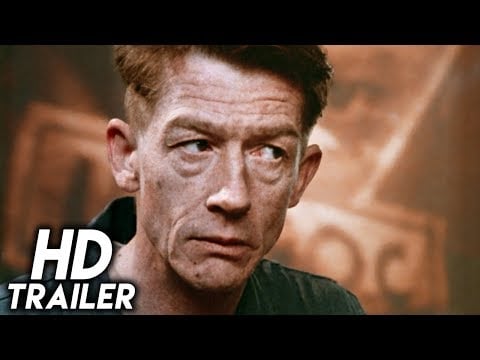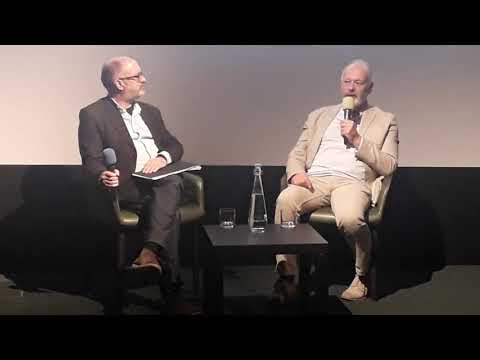Michael Radford’s “Nineteen-Eighty-Four” (1984) had the distinction of arriving on the year in which George Orwell’s 1949 novel was set. That’s far from the only remarkable thing about it.
The story is as most will remember it from high school English class (why did so many of us read it then and not in college?): Winston Smith (John Hurt) is living a miserable, conformist existence in a world under complete control by the powerful Big Brother.

Political rallies where citizens are forced to sit and watch hateful propaganda, while audibly expressing their hatred, are commonplace. So is living in a ratty apartment where every room has a camera watching your every move, as well as a TV set where the face on the other side of the screen can see your every move.
Winston appears to be defeated and unable to rebel, as it seems the will to do anything but go through the motions has left him. Then, he falls in love, and the real trouble begins.
Hurt’s performance is consistent with the film itself – downcast, still and glum. Aside from general sympathy, it’s hard to feel anything for Winston. The film overall is in line with Orwell’s vision, sometimes to a precise degree, but I detected more life in the character Orwell wrote on the written page than in Hurt’s unceasingly dour performance.
I’m not saying his acting isn’t tremendous, only that I was hoping to like Winston Smith a lot more.
Far better is Susanna Hamilton as the doomed Julia and a magnificent performance by Richard Burton, in his final film role. The latter is so unforgettable here, it baffles me that he was wasn’t awarded a post-humous Oscar for his work.
Worthy of note is Bob Flag’s steely-eyed mug in the role of Big Brother. His recurring image gets more discomforting over the course of the movie.
The sets and approach capture the tone of the source material, as does a heartbreaking performance by Gregor Fisher, playing Winston’s friend and fellow captive. Fisher has one of the most impactful moments, conveying how hopeless it is to try to resist Big Brother, though some are brave enough to try.

“Nineteen-Eighty-Four” never fully taps into the absurdity of the material, such as how Winston can do anything in his apartment, as long as the Big Brother screen isn’t facing him. It isn’t fair to keep comparing the film with the book, as Radford not only goes out of his way to replicate the novel’s vividly chilling details but is able to utilize an R-rating, unlike prior adaptations.
Yet, as accomplished as this “Nineteen-Eighty-Four” is (and those who were blown away by Orwell’s novel should definitely see it), I can’t help but look to a movie that arrived a year later that I like so much better.
For all the official and unofficial adaptations of Orwell’s novel, no one has done Orwell better than Terry Gilliam’s “Brazil” (1985). Despite the moments of slapstick comedy and whimsical fantasy, Gilliam’s film doesn’t soften Orwell’s overall intent (in fact, his ending is much tougher than Radford’s).

There’s so much in Orwell’s story, as well as in the visual presentation in Radford’s film, that has carried over elsewhere, ranging from “The Handmaid’s Tale” (1990), “V For Vendetta” (2005), “Equilibrium” (2002 and “Fahrenheit 451” (1966). It’s gotten to the point that it almost feels like a “shared universe,” or a specific contrast to the towering metropolitan futurism of “Metropolis” (1927), “Blade Runner” (1982) and “The Matrix” (1999).
While not a sizable hit when released in the year of tis title, “Nineteen- Eighty-Four” did manage to garner some controversy over the use of Eurythmics music on the soundtrack and how some felt it wasn’t fitting to the integrity of Orwell’s vision. It was a dumb controversy, comparable to the out in the open and stupid Bob Seagar vs. Bruce Springsteen songs battle that partly distracted from Peter Bogdanovich’s otherwise terrific “Mask” (1985).
For the record, I love the Eurythmics songs and music, as well as Radford’s recurring visual of idyllic freedom just behind a closed door down a long hallway.

Even purists and Orwell devotees can’t deny that the third act, with its lengthy torture scenes, is a lot to ask of the audience, as well as redundant (Hurt always seems to be, well, hurt, even when Winston has moments of fleeting happiness).
The final line of Orwell’s novel is devastating, but the movie fumbles it.
Its arguable that Ridley Scott’s Orwell-inspired, still-remarkable Apple Superbowl ad, which aired in 1984, is as stunning as any feature-length film based on Orwell’s novel. My recommendation: watch Scott’s ad before watching Radford’s film, as it feels like a proper prelude.
While falling short of its earnest effort to be definitive, Radford’s adaptation is always compelling, deserves a proper retrospective on its 40th anniversary and doesn’t back away from the harsh prophecies it carries.
The post The One Movie That Out-Orwelled ‘1984’ appeared first on Hollywood in Toto.
from Movies - Hollywood in Toto https://ift.tt/vCYex2B

0 Comments: